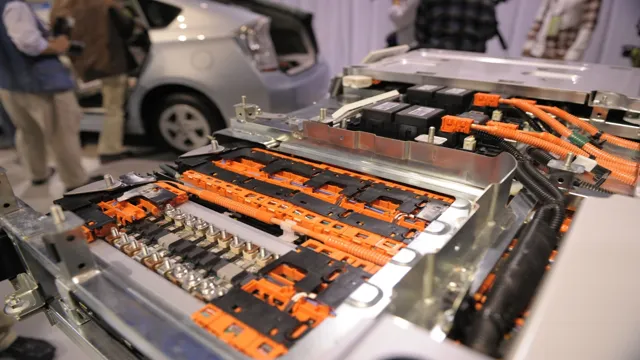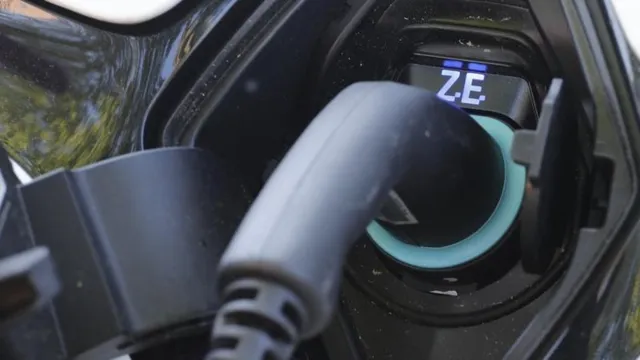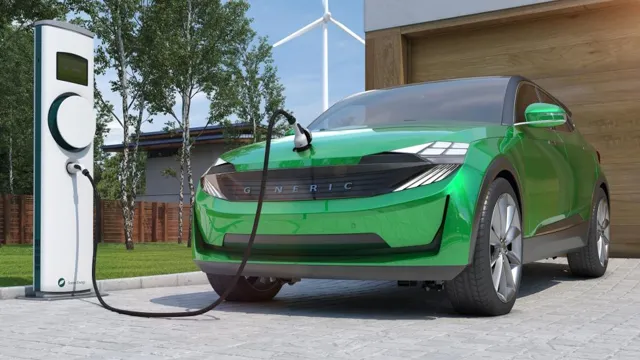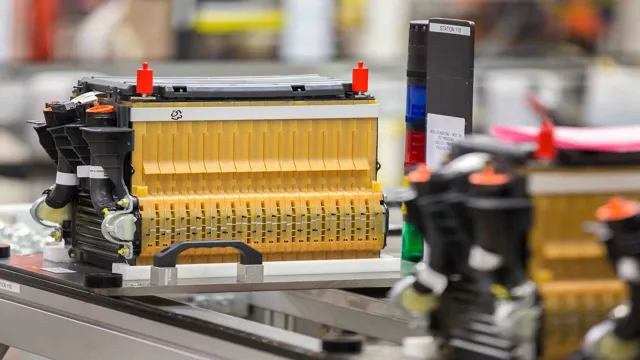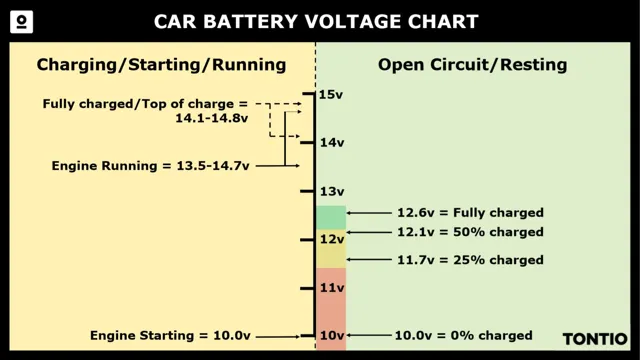Powering the Future: The Benefits and Innovations of Lithium-Ion Electric Car Batteries
Electric cars have been on the rise in recent years, providing an eco-friendly alternative to gas-guzzling vehicles. But have you ever stopped to consider what powers these electric cars? The answer lies in their batteries, specifically lithium-ion batteries. These powerful batteries have become the go-to choice for almost all electric car manufacturers due to their high energy density and long lifespan.
Lithium-ion batteries are used in a wide range of electrical devices due to their superior performance and durability. However, electric car batteries represent their most extensive application. The high energy density of lithium-ion batteries allows electric cars to travel greater distances per charge.
Moreover, their long life span significantly reduces the cost of battery replacement, making electric cars a more affordable option in the long run. But what sets lithium-ion batteries apart from other types of batteries? The answer lies in their chemical composition. Lithium-ion batteries consist of two electrodes – a cathode and an anode – with a separator in the middle.
When the battery is charged, lithium ions move from the cathode to the anode, storing energy. When the battery is discharged, the opposite happens; the ions move from the anode back to the cathode, generating an electric current that powers the car’s motor. In conclusion, electric cars have revolutionized the automotive industry, providing an eco-friendly alternative to gas-powered vehicles.
This transformation has been made possible thanks to the power of lithium-ion batteries, which provide high energy density and long-lasting performance. As the world continues to shift towards a more sustainable future, electric cars powered by lithium-ion batteries are likely to become even more prominent, paving the way towards a greener future.
Advantages of Lithium-ion Batteries
When it comes to choosing an electric car battery, lithium-ion technology is one of the best options available on the market today. Lithium-ion batteries offer several advantages over other types of batteries, including a greater energy density, a longer lifespan, and a faster charging time. This means that electric cars with lithium-ion batteries can drive farther and require less time to recharge, making them a more convenient and practical choice for daily use.
Additionally, lithium-ion batteries are lightweight and compact, which makes them ideal for use in smaller electric vehicles. Overall, the advantages of lithium-ion batteries make them an excellent choice for anyone looking to get the most out of their electric car.
Higher Energy Density
When it comes to batteries, one key factor that’s always important to consider is energy density – that is, how much energy a battery can store in relation to its weight or volume. When it comes to lithium-ion batteries, their higher energy density is one of their biggest advantages. They can store more energy in a smaller and lighter package, which is especially important for portable devices like smartphones and laptops.
This means that lithium-ion batteries can provide longer run times and more power to these devices, making them more efficient and convenient to use. In addition, lithium-ion batteries also have a lower self-discharge rate than other types of batteries, which means they can hold onto their energy for longer periods of time without needing to be recharged. Overall, the higher energy density of lithium-ion batteries makes them a reliable and efficient choice for a wide range of applications.
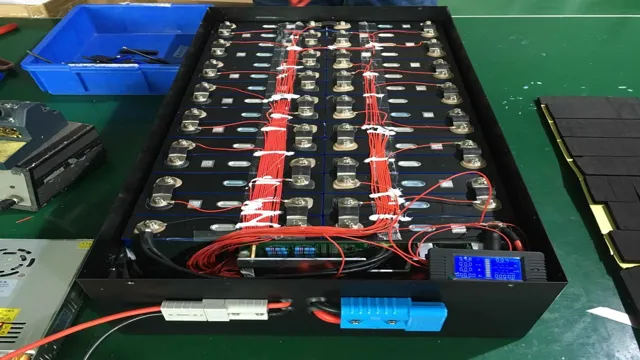
Longer Lifespan
Lithium-ion batteries are widely known for their longer lifespan, which is one of their most significant advantages. These batteries can last for several years, making them more cost-effective than traditional batteries in the long run. The secret behind their longevity lies in their chemistry.
Lithium-ion batteries contain an anode made of graphite and a cathode made of lithium cobalt oxide, which work together to hold and release electric charge. This chemical reaction is sustainable for an extended period, which contributes to the battery’s long lifespan. Moreover, lithium-ion batteries do not require regular maintenance, unlike their counterparts.
This means that you can simply charge them and use them without worrying about their upkeep. Their longer lifespan makes them an ideal choice for various applications, such as electric vehicles, solar energy systems, and portable electronics. With their extended battery life, you can enjoy uninterrupted power supply, which is crucial for many essential devices.
Faster Charging
When it comes to charging, Lithium-ion batteries are a game-changer. They charge faster compared to traditional batteries, and this is because of their unique chemical composition. Lithium-ion batteries have a higher energy density, which means they can store more energy in the same amount of space.
This results in faster charging times and extended battery life. Additionally, Lithium-ion batteries do not suffer from the memory effect, a phenomenon where batteries lose their maximum charge capacity over time. This means that they retain their full charge capacity for longer periods of time, making them ideal for use in portable devices.
In summary, Lithium-ion batteries offer a significant advantage when it comes to charging, making them the best choice for powering modern technology.
Challenges and Solutions
One of the biggest challenges facing the electric vehicle industry today is the need for efficient and long-lasting batteries. Lithium-ion batteries have become the standard for electric car batteries due to their high energy density and long lifespan, but they come with their own set of challenges. One such challenge is the risk of thermal runaway, which can result in the battery overheating and catching fire.
To address this issue, researchers are working on developing new materials and designs for the batteries, such as solid-state lithium-ion batteries that use solid electrolytes instead of liquid ones. Another challenge is the availability and cost of the raw materials needed for the batteries, such as lithium and cobalt. Efforts are underway to develop sustainable sources of these materials, as well as alternative battery chemistries that are less reliant on them.
Overall, while there are still challenges to overcome, the industry is making significant strides in developing better and more sustainable electric car batteries.
Price and Availability
When it comes to pricing and availability, businesses are often faced with challenges that can significantly affect their sales and revenue. One major challenge is dealing with fluctuating market demand. Burstiness in demand can cause a sudden increase in prices due to the limited availability of products or services.
On the other hand, if there is a surplus of products, then prices may be lowered to remain competitive. Another challenge is ensuring that the products and services are priced correctly based on the value they offer, customer demographics, and market competition. To overcome these challenges, businesses can utilize data analytics to help predict market demand and adjust their prices accordingly.
They can also evaluate their pricing strategies frequently, adjust them as necessary, and continually monitor market trends to remain competitive. Overall, businesses need to remain flexible and adaptable to overcome the challenges surrounding pricing and availability to ensure they meet customer needs and stay ahead of their competitors.
Temperature Management
Temperature management in various industries poses significant challenges. It’s crucial to maintain optimal temperature for goods and equipment, but it’s not always easy to do this in various environments. For example, in the food industry, perishable items such as fruits, vegetables, and meat require specific temperature ranges to prevent spoilage and contamination.
Simultaneously, in warehouses and manufacturing industries, equipment may overheat and cause damage if not cooled at the right temperature. The key to addressing these temperature management challenges is implementing the right solutions. One solution is utilizing technology such as smart sensors and monitoring systems to track temperature changes and take action when necessary.
Additionally, investing in proper insulation and ventilation in warehouses and production facilities can help regulate temperatures to prevent equipment damage. Overall, by implementing the right solutions, industries can effectively manage temperatures, ensuring goods and equipment remain at the appropriate temperature levels.
Future of Lithium-ion Batteries
As the market for electric cars continues to grow, so does the demand for advanced and efficient battery technology that can power them. Lithium-ion batteries are currently the most common type of battery used in electric cars due to their high energy density and long lifespan. However, there are still limitations to their performance that researchers are working to address.
One major challenge is improving the lifespan of these batteries, as they tend to degrade over time and lose their ability to hold a charge. Another area of focus is increasing the energy density of lithium-ion batteries to enable longer driving ranges. Fortunately, advancements in materials science and chemistry are rapidly progressing, leading to the development of new technologies that could revolutionize electric car battery lithium technology.
Solid-state batteries, in which the liquid electrolyte is replaced with a solid one, may offer higher energy density, longer life, and better safety features. Other promising approaches include using silicon anodes and lithium-sulfur batteries. With continued research and innovation, the future of lithium-ion batteries looks bright, bringing new possibilities for electric transportation and sustainable energy solutions.
Research and Development
As technology advances, scientists and researchers continue to explore the potential of lithium-ion battery technology. The future of these batteries looks bright, with improvements being made in their capacity, durability, and charging times. One exciting development is the use of solid-state batteries, which replace the traditional liquid electrolyte with a solid one, increasing the battery’s energy density and reducing the risk of leaks or fires.
Another area of research is the development of lithium-air batteries, which could potentially provide more power than currently available lithium-ion batteries. However, there are still challenges to overcome, such as improving the battery’s lifespan and preventing the formation of damaging byproducts during charging. The use of nanomaterials to improve battery performance and reduce costs is also an area of active investigation.
Even with these advancements, there are still limitations to lithium-ion batteries, such as their reliance on rare earth metals and concerns about their environmental impact. As such, researchers are also exploring alternative battery technologies, such as all-solid-state batteries and sodium-ion batteries. In conclusion, the future of lithium-ion batteries is full of potential and exciting developments that could revolutionize the energy industry.
While the technology still has limitations, continued research and development are sure to push the boundaries of what lithium-ion batteries are capable of achieving.
Sustainable Production
The future of lithium-ion batteries is a topic of significant interest in the sustainable production world. These batteries are crucial in the development of renewable energy sources and the transition towards a greener future. With the demand for electric vehicles and energy storage systems increasing, the importance of sustainable production of lithium-ion batteries cannot be overstated.
While the production of these batteries has improved over the years, there are still several environmental concerns, including the mining of lithium and the disposal of batteries at the end of their life cycle. However, researchers and manufacturers are actively seeking solutions to these challenges, with some focusing on the use of recycled materials and others exploring alternative battery chemistries. The key to truly sustainable production of lithium-ion batteries will involve a combination of technological innovations and responsible raw material sourcing.
As we move towards a more sustainable future, the success of lithium-ion batteries will undoubtedly play a significant role.
Conclusion
In conclusion, the use of lithium in electric car batteries is nothing short of electrifying! With its high energy density and long-lasting durability, it’s no wonder that lithium-ion batteries have become the go-to choice for the automotive industry. And as technology continues to advance, we can expect even more exciting breakthroughs in electric car battery capability. So let’s charge ahead into the future of transportation, powered by lithium and our unstoppable innovation!”
FAQs
How long does a lithium battery typically last in an electric car?
Lithium batteries in electric cars can typically last around 8-10 years or up to 200,000 miles before they need to be replaced.
Are lithium batteries the only type of battery used in electric cars?
No, while lithium batteries are the most common type used, some electric cars also use other types of batteries such as lead-acid or nickel-metal hydride.
How does the size of the lithium battery affect the range of an electric car?
Generally, the larger the lithium battery, the longer the range of the electric car will be. This is because a larger battery can hold more energy and power the car for a longer distance.
Can lithium batteries be recycled once they are no longer usable in an electric car?
Yes, lithium batteries can be recycled to use their components and materials again. This helps reduce waste and environmental impact.
